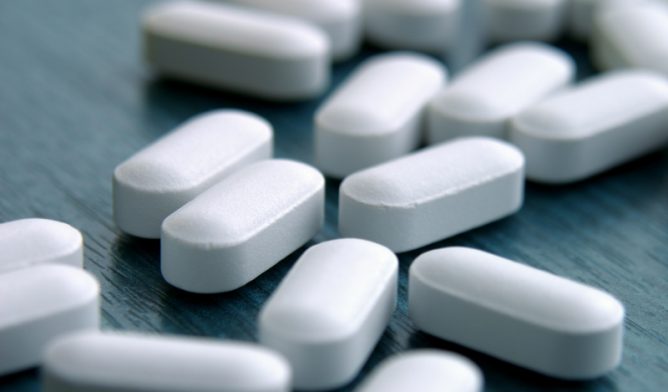Do Your Talc-Based Dietary Supplements Contain Asbestos?
Health & WellnessWritten by Suzanne Dixon, MPH, MS, RDN | Edited By Walter Pacheco

Some mesothelioma patients turn to natural remedies to boost their health during and after cancer treatment.
While some dietary supplements are proven safe and effective through well-designed research studies, the vast majority have no evidence to support safety or efficacy.
An article published Aug. 1 by ConsumerLab.com raises potential safety issues related to dietary supplements made with talc, because talc can be contaminated by the cancer-causing substance asbestos.
Dietary supplements are much more loosely regulated than medications and medical devices, creating a situation of buyer beware.
Exposure to asbestos through talc-based products may lead to serious health conditions years later, including lung cancer, asbestosis and mesothelioma cancer.
Why Is Talc in Dietary Supplements?
Talc is used as an anti-clumping agent. It also prevents supplement ingredients from sticking to tablet-making machinery.
As a food additive, talc is “generally recognized as safe” (GRAS) by the U.S. Food and Drug Administration (FDA). GRAS refers to a substance added to food and considered safe by experts.
The GRAS designation means a substance does not need to meet Federal Food Drug, and Cosmetic Act food additive tolerance requirements.
Based on expert opinion, it is simply assumed these substances are safe when consumed as intended.
Talc in dietary supplements is not known to pose a cancer risk. However, this is based on the assumption that the talc is not contaminated by asbestos.
Connection Between Talc and Asbestos in Dietary Supplements
Based on its GRAS status, the talc used in dietary supplements does not have to undergo testing for purity or contamination.
Asbestos and talc are minerals mined from the earth.
Certain types of asbestos occur in the natural environment alongside talc. When talc is mined for commercial use, it can be contaminated with asbestos.
There are no federal regulations prohibiting the presence of asbestos in talc products.
The FDA considers asbestos-contaminated talc unacceptable for use in any product. However, the agency can only act if a product is scientifically proven to cause harm.
Dietary supplements aren’t regulated by the FDA. Instead, they fall under the Dietary Supplements and Health Education Act (DSHEA) of 1994.
DSHEA defines a dietary supplement as a product intended to supplement the diet and includes one or more dietary ingredients such as:
-
A vitamin, mineral, herb or other botanical
-
Amino acids
-
A concentrate, metabolite, constituent or extract
A “new dietary ingredient” is defined as one that meets the above definition but was not sold in the U.S. in a dietary supplement before Oct. 15, 1994.
Under DSHEA, once a dietary supplement product is marketed, the FDA must show it is “unsafe” before restricting use or removing it from the marketplace.
In other words, dietary supplement manufacturers do not have to ensure a product is safe before releasing it.
The FDA will consider evaluating safety only after reports of adverse effects or harm are logged through the official FDA Adverse Event Reporting System.
This is unlike new drug products. Drugs must be proven safe and effective for their intended use before approval and marketing.
Role of Third-Party Supplement Testing Organizations
ConsumerLab.com is the oldest third-party certification program of dietary supplements.
Companies can, voluntarily, pay a fee to have independent testing done for purity, contamination and active ingredients. Other product reviews are funded through subscriptions to the website.
There also are other dietary supplement rating and testing companies.
Because the FDA does not regulate these products, these groups play an important role in helping consumers find safe and reliable dietary supplements.
ConsumerLab has not tested for asbestos in supplements specifically, but they raised the issue in a question-and-answer section on their website.
According to the Q&A, the FDA does not provide specifications on quality of talc for use in supplements.
FDA tests in 2009 and 2010 did not find asbestos contamination in samples of “cosmetic-grade” talc provided by suppliers. There are no recent test results for “food-grade” talc.
Finding Asbestos-Free Dietary Supplements
There is only one way to know for certain if the talc used in dietary supplements is free of asbestos: The talc must be labeled as “USP.”
USP stands for U.S. Pharmacopeial Convention.
The USP was created to bridge the gap between lack of government oversight of dietary supplements and the need for safe dietary supplements.
Only supplement products indicating “talc USP” are guaranteed free of asbestos. Most products do not specify the talc component as USP.
For this reason, there is no way to know if talc-containing supplements are contaminated with asbestos.
Selecting Safer Supplements
While there are no guarantees, experts note a few steps to help people select high-quality, safer dietary supplements that are free of dangerous contaminants.
Recommended precautions include:
-
Selecting products with USP certification for some or most of the ingredients
-
Asking a pharmacist, dietitian or doctor for a recommended brand
-
Avoiding smaller, boutique brands
-
Sticking to well-recognized brands, which tend to adhere to more stringent manufacturing processes






